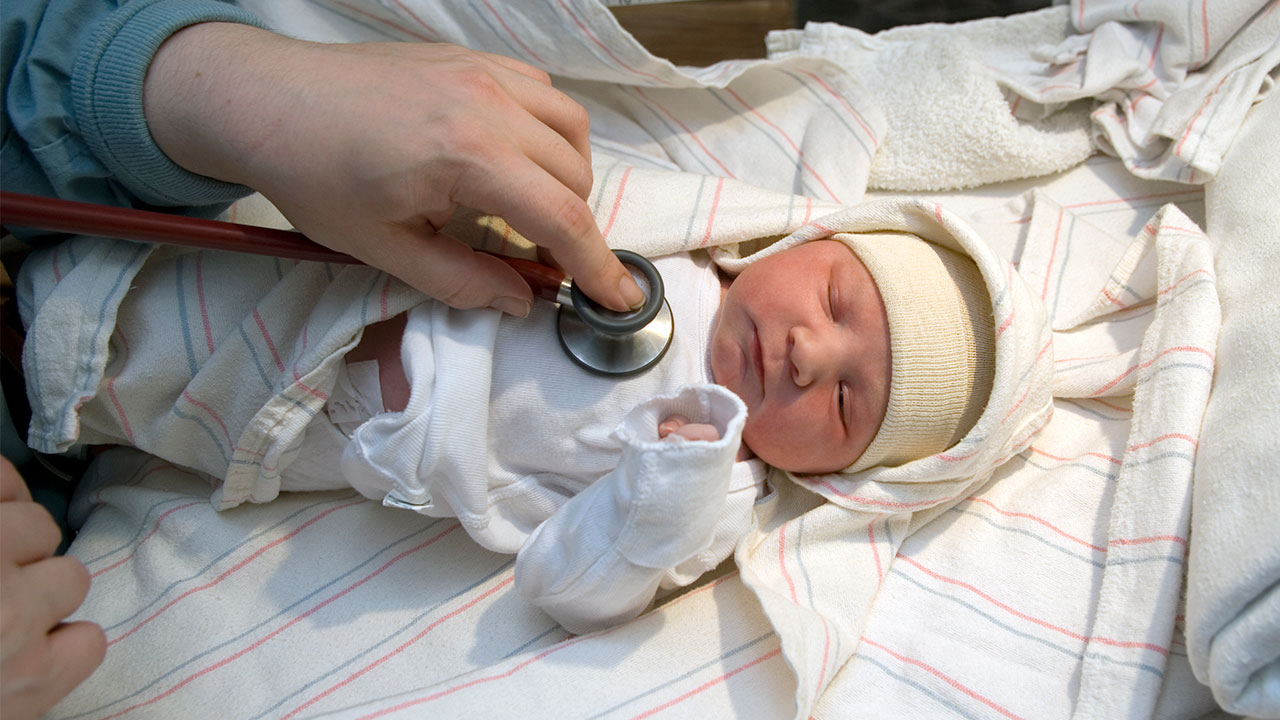

Newborn screening is the practice of testing all babies in their first days of life for certain disorders and conditions that can hinder their normal development. This testing is required in every state and is typically performed before the baby leaves the hospital. The conditions included in newborn screening can cause serious health problems starting in infancy or childhood. Early detection and treatment can help prevent intellectual and physical disabilities and life-threatening illnesses.
The routine evaluation of a newborn includes a series of laboratory tests. These tests are valuable because they have the potential to identify diseases and disorders before symptoms appear and before serious complications arise. Early detection allows treatment that can prevent the development of serious health problems.
Various conditions that may be present at birth (congenital) can affect the health and well-being of a newborn. Most of these conditions are rare, although some are more frequent in certain families or ethnic groups. The disorders range from difficulties in processing certain nutrients (metabolic), to problems with hormones (endocrine), to the production of abnormal forms of hemoglobin, the oxygen-carrying protein in red blood cells. Some of these conditions cannot be cured, but many can be managed so that the child can grow and live a relatively normal life.
Screening tests for newborns help identify potentially treatable or manageable congenital disorders within days of birth. Life-threatening health problems, mental retardation and serious lifelong disabilities can be avoided or minimized if a condition is quickly identified and treated.
Newborns can undergo routine screening tests to detect many of these disorders before leaving the hospital with a few drops of blood. Each state has its own newborn screening program, so the number of tests performed varies by state.
All newborns will be screened for 34 core disorders and 26 secondary disorders.
- Metabolic disorders (e.g., phenylketonuria, PKU)
- Endocrine disorders (e.g., congenital hypothyroidism [CH] and congenital adrenal hyperplasia [CAH])
- Hemoglobin disorders (e.g., sickle cell anemia)
- Other disorders (e.g., cystic fibrosis, severe combined immunodeficiencies (SCID))
Reminders to parents:
- Parents should also know that special collection techniques are used with newborns to minimize discomfort during sample collection. In most cases, all tests can be performed with a few drops of blood obtained from a punctured heel. Requesting additional tests will generally not require additional heelsticks or blood from your newborn.
- Screening tests for newborns are usually performed within 24 to 48 hours of life. For some tests, such as phenylketonuria (PKU) and congenital hypothyroidism (CH), it is important that they are not performed too soon after birth. They may not accurately reflect whether a disorder exists if it is performed within the first 24 hours of life. Since women and their newborns can be discharged within one or two days after birth, it is possible that a newborn can be tested with a sample taken within those first 24 hours. Consequently, some states routinely recommend screening twice, once in the hospital and then approximately 2 weeks later. This second screen is made to maximize the accuracy of the tests.
- The time it takes for test results varies by program. In general, the results of the newborn evaluation will be available within 10 to 14 days from the moment the sample was taken. Ask your health professional about the results if you do not receive an answer to make sure the tests were performed and the results were normal. If the results indicate that more tests are needed, your baby’s healthcare professional will notify you as soon as possible.
- If your baby needs more tests, your healthcare professional or the program coordinator will contact you and tell you what to do next. Additional tests do not necessarily mean that your baby is sick, just that more tests are needed to make sure there is no problem. If follow-up tests are needed, they should be done as soon as possible in case your baby needs immediate treatment.
Infectious Diseases
In general, newborns are tested for infectious diseases only if they show signs and symptoms. Currently, asymptomatic newborns can be screened for two infectious diseases: HIV or hepatitis B. In general, these screening tests are only performed if the mother is known to have the disease or if the test was not done during pregnancy. and, therefore, its disease status is unknown. . Some states require HIV testing of all newborns. Although newborns may not show signs or symptoms of infection, they may have contracted the disease during pregnancy or childbirth. The treatment can be given shortly after birth to protect the health of the newborn.
RELATED POSTS
View all
